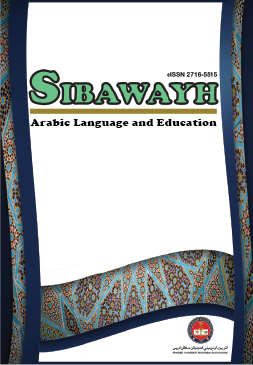أهمية البلاغة العربية في تفسير القرآن
The importance of Arabic rhetoric in the interpretation of the Qur’an
Keywords:
Arabic rhetoric, Miracles, Meanings of the Quran, Eloquence, Fatwas and rulingsAbstract
The Qur'an, which is in Arabic, was revealed for two main purposes: the guidance of the people and the testimony to the sincerity of the prophecy of Muhammad (peace be upon him). This means that the Qur'anic verses from the beginning of their wall to the end are guidance and miracle. There's no One of the verses of the Qur'an is both a guidance and a miracle. Because such guidance and miracle in the Qur'an are like one coin with two faces and cannot be separated. To separate them is equal to the death of the same spirit of the Qur'an. It is as if the guidance of the Qur'an is hidden behind its miracle, while miracles in which scholars do not differ in its eloquence. Guidance is the guidance that guides people to act or leave them, and this must be applied in the real world in everyday life in the form of actions to prove the guidance of the Qur'an. How can guidance be achieved and applied concretely without understanding the rhetoric, since it is the product of the Qur'an? It is therefore not a denier that eloquence is important in revealing the deepest meanings of the Qur'an, where it is guided. This desired disclosure will only be reached through an in-kind interpretation as a basic means.
Downloads
References
Ahmed Amin, Daha al-Islam, Egyptian Renaissance Library, Cairo, i.333, without a year.
Ahmed Amin, Dawn of Islam, Egyptian Renaissance Library, Cairo, I.11, 1975.
Ahmed Mohammed al-Hofi, Dr. Al-Zamakhshari, Egyptian General Book Authority, without a year.
Ahmed Mustafa Al-Maraghi, History of Rhetorical Sciences and The Introduction of Its Men, Mustafa Al-Babi Al-Halabi Library and Press Company in Egypt, I.1.S. 1369 E.
Ahmed Mustafa Al-Maraghi, Rhetorical Sciences, Mahmoudia Commercial Library, i.e. 5.
Ahmed Al-Hashimial, Jawhar Al-Ghagha, Dar al-Fikr.i. 12.
Amin al-Kholi, Curriculum of Innovation in Grammar, Eloquence and Literature, Dar al-Knowledge.
Ihsan Sadiq Saeed Dr., Arabic and Persian Rhetoric, Iranian Cultural Chancellery in Damascus, I.1., S.1421H /2000M.
Badreddine Mohammed bin Abdullah al-Zarkshi, Al-Burhan in Qur'anic Sciences, Dar al-Knowledge Printing and Publishing, Beirut, without a year.
Badawi Tabaneh Dr., Kadlama bin Jaafar and Literary Criticism, Anglo-Egyptian Library.
Badawi Tabaneh, Dr. Abu al-Hilal al-Askari and his rhetorical and critical measures, The Anglo-Egyptian Library.
Jalaluddin Abdul Rahman al-Suyuti, Mastery in Qur'anic Sciences, Dar al-Knowledge for Printing and Publishing, Beirut, Without A Year.
Hassan Mahmoud al-Shafei, Entrance to the Study of Speech Science, Cairo, Library and Wahba, 111411 / 1991.
Hussein Moanas, Atlas, History of Islam, Zahra arab media, Cairo, 1407 / 1987.
Hussein Al-DhahabiDr, Interpretation and Interpreters, Library and Wahba, I.3, S.1405 / 1985.
Daoud Salloum, Doctor, History of Arab Criticism from Jahiliya until the end of the third century, Ayman Press, Baghdad, S. 1969.
Al-Dasuki, footnote to the brief commentary of The Sign Saad al-Din Al-Taftazani on board the summary, Dar al-Caliphate Al-Aala, C. 1-2., S. 1307 H.
Mr. Zaghloul, Intellectual Trends in Interpretation, Egyptian General Book Authority, Alexandrian, 1397/ 1977.
Shawky Guest Dr., Eloquence Evolution and History, House of Knowledge, i.6.
Shawky Guest Dr. History of Arabic Literature, Dar al-Knowledge, i.e. 7.
Sobhi Saleh, Qur'an Scholars, Dar al-Alam for Millions, Beiruttt, i. 10, 1977.
Abdul Aziz Bin Mohammed al-Faisal Dr., Arabic Literature and History, Saudi Arabia, Ministry of Higher Education, Imam Bin Saud Islamic University, TZ 1., S. 1405 H.
Abdel Ghani Mohammed Saad Baraka Al-Dr., Qur'anic da'wa style, eloquence and manja, Library and Heba, 14 Al-Mahouriyah Street- Abidin, Cairo.
Abdul Ghani Mohammed Saad Baraka Al-Dr. Al-Ajaz al-Qur'ani, his faces and secrets, Library and Wahba 14. Al-Jumhuriya Street- Abidin, Cairo.
Dr. Abdel Fattah Lachin, Meanings in the Light of the Methods of the Qur'an, Dar al-Ma'am, T.2., S. 1978.
Abdul Qadous Abu al-Saleh and Ahmed Tawfiq Kleeb, Writer satiat, Maani and Badi, Saudi Arabia, Imam Mohammed Bin Saud Islamic University, S. 1399 Ah- 1979.
Abdelkader Hussein Dr. Art of Eloquence, Amanat Press, Egypt, without a year.
Ali Abyei Zayed, Dr., Arabic eloquence history. Sources.. Its curriculum, Youth Library 26, Ismail Meri Street, 21825. - Abedin.
Mohammed Barakat Hamdi Abu Ali, Approaches and Opinions in the Language of the Qur'an, Al-Fidh Publishing and Distribution House, Amman, 1984.
Muhammad Bakr Ismail, Studies in Qur'anic Sciences, Dar al-Manar Printing, Publishing and Distribution, i.1, 1411 / 1991.
Muhammad Taqi al-Madrasi, Islamic gratitude between the theories of mankind and the revelations, Dar al-Bayan al-Arabi, i.3, 1412 / 1992.
Muhammad Khalafallah Ahmed and Dr. Mohammed Zaghloul Salam, three letters in the miracle of the Qur'an, Dar al-Knowledge in Egypt, i.3.
Muhammad Abdul Azim al-Zarqani al-Sheikh, Manahl al-Irfan in Qur'anic Sciences, The Revival House of Arabic Books Isa al-Babi al-Halabi and his partners, without a year.
Mahmoud bin Omar Mohammed bin Omar al-Khwarizmi al-Zarkshi, Scout in download facts and the eyes of the sayings in the faces of the ta'wil, Dar al-Qa'ad for printing and publishing, Beirut, Lebanon. Without a year.
Mustafa Al-Sawi Al-Jouini, Dr., Curriculum in Interpretation, Origin of Knowledge in Alexandria, Without A Year.
Mustafa Al-Sawi Al-Jouini, Dr. Al-Zamakhshari's Qur'an, Dar al-Ma'a'am, Egypt, without a year.
Mustafa Musallam, Objective Interpretation Investigator, Dar al-Qalam, Damascus, I.1, S. 1310 / 1989.
Manaa al-Qattan, Qur'anic Science Symbiosis, Riyadh Knowledge Library, I.2, S. 1408 \ 1988.





